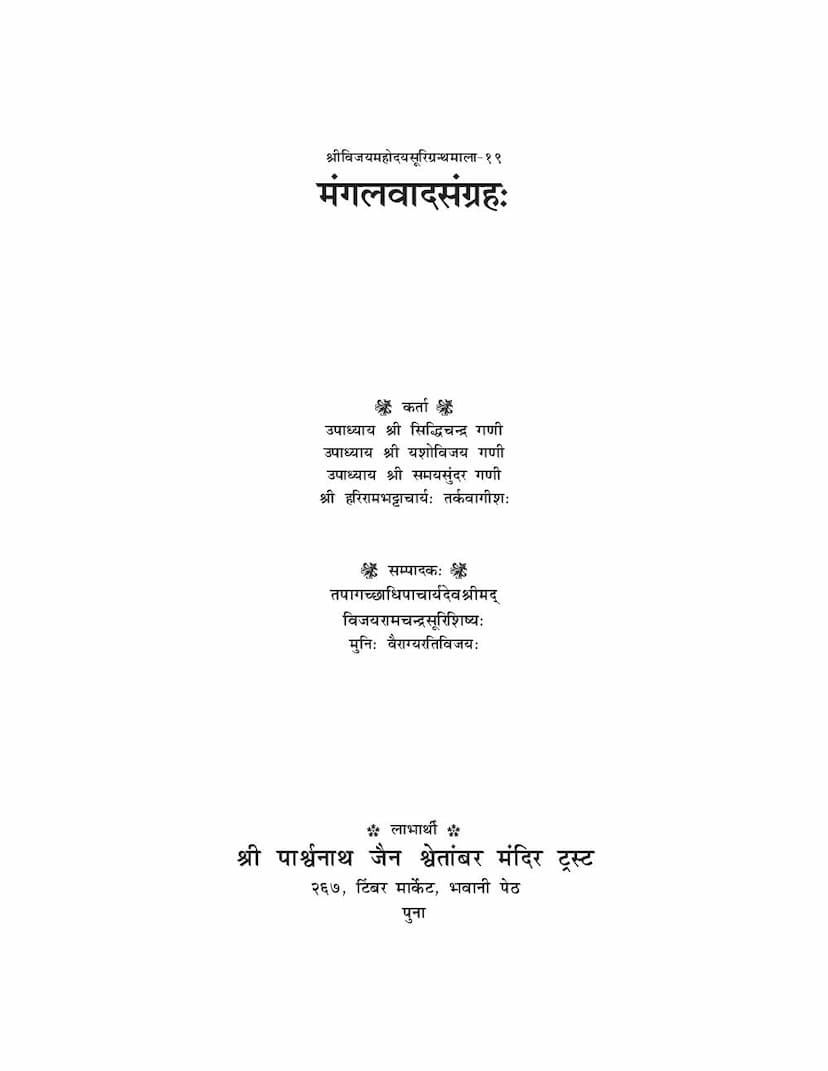Mangalvada Sangraha
Added to library: September 2, 2025

Summary
This document is a Jain text titled "Mangalvada Sangraha" (Collection of Discussions on Mangala), compiled and edited by Muni Vairagyarativijay, a disciple of Acharya Shrimad Vijayaramachandrasuri. Published by Pravachan Prakashan, Pune, in 2007, it is part of the "Shri Vijayamahodaya Suri Granthamala," specifically the 19th publication. The text delves into the philosophical concept of "Mangala" (auspiciousness) within Jainism, exploring its definition, types, and its role, particularly in the context of scholarly discourse ("Vada").
The book's structure, as outlined in the "Anukram" (Table of Contents), suggests a comprehensive exploration of "Mangalavada," including:
- Introduction by Muni Vairagyarativijay: This likely sets the context and purpose of the collection.
- Definitions and types of Mangala: The text defines "Mangala" based on etymology and established philosophical schools, distinguishing between different types:
- Ashirvadatmak (Benedictory): Involving blessings.
- Namaskaratmak (Salutations): Showing reverence to deities or revered figures.
- Vastu-nirdeshatmak (Indicative of Object): Mentioning auspicious or merit-generating entities or concepts.
- Definition of Vada (Debate/Discussion): It explains the concept of "Vada" as a structured intellectual exchange based on logic, evidence, and established principles, aiming for truth determination rather than mere victory.
- Subject Matter of Mangalavada: This section delves into the core debate surrounding Mangala, originating from the philosophical counterpoints: "Is Mangala beneficial?" and "What is the fruit of Mangala?" The text highlights the debate between ancient and modern Nyaya schools on the causality of Mangala.
- Discussions by Prominent Scholars: The collection includes detailed analyses of Mangalavada by several key Jain scholars:
- Upadhyay Shrimad Siddhivijayagani: His work on Mangalavada is presented, covering theistic and atheistic viewpoints, ancient Nyaya perspectives, and the definition of Mangala and its various forms. His approach, based on "Tattvachintamani," is central to the discussion.
- Hariram Bhattacharya Tarkavagisha: His treatise on Mangalavada, possibly published for the first time, is included. He focuses on the causality of Mangala, presenting arguments for its efficacy and discussing the role of auspicious acts in achieving desired outcomes, referencing scholars like Ruchidatta Mishra and Shashadhara.
- Upadhyay Shrimad Yashovijayagani: His contribution, likely drawn from his "Svadadakalpalata" commentary, offers a refined perspective on Mangala, emphasizing the Jain viewpoint and refuting arguments against its efficacy. He addresses the nature of causality and the role of intention.
- Upadhyay Shrimad Samaysundarji: His "Mangalavad-Prashnottara Paddhati" (Question-Answer Method of Mangalavada) is a simpler, introductory work suitable for beginners.
- Appendices: To provide a broader understanding, the collection includes relevant texts on Mangalavada from other prominent sources:
- Visheshavashyak Bhashya (Mangalavada portion): Offering an ancient Jain perspective.
- Kirnavali (Mangalavada portion) by Acharya Udayana: Representing the ancient Nyaya school's view.
- Tattvachintamani (Mangalavada portion) by Upadhyay Gangesha: Presenting the new Nyaya school's perspective.
- Biographical Information: The book dedicates significant space to the biographical details of Mahopadhyaya Shrimad Siddhivijayagani, detailing his life, scholarly contributions, and disciples. It highlights his mastery of various philosophical schools, his interactions with the Mughal court (especially Emperor Akbar and Jahangir), and his role in resolving sectarian disputes. His extensive literary output is cataloged, including commentaries on classical works and original treatises.
In essence, "Mangalavada Sangraha" serves as a comprehensive repository of Jain philosophical thought on the significance and efficacy of auspicious observances, particularly as a prelude to scholarly pursuits. It aims to elucidate the complex arguments surrounding the concept of Mangala, tracing its development through the contributions of eminent Jain scholars and offering insights into the historical and intellectual context of these discussions.